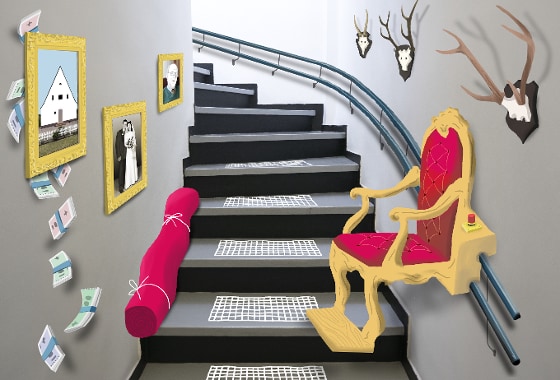
When it comes to retirement, many people in Switzerland expect their homes to play a key role. Central to their plans, is the desire to live as long as possible at home after leaving the workforce, free-from-care, in familiar surroundings – and of course rent-free. In fact, many pull it off. Aside from children still living with their parents, the share of people around the age of 65 still living in their own home is exceptionally high. This share only drops at age 75, when increasing numbers decide to move to a retirement home or rented apartment.
Affordability – a high hurdle
Yet in numerous cases, the move to a rental apartment is forced because the original dream of growing old in your own home can't be sustained. Generally, this depends on a combination of diminishing income and a mortgage that is either too high or too low. How so? More often than not, problems are triggered by the sharp fall in income that many employed people must accept when they step into retirement. Not infrequently, disposable income sinks by 30 to 40%. These declines may be even greater if there is a gap in the pension fund because money was withdrawn earlier to finance a real estate purchase.
Many elderly end up on their lending bank's radar because they no longer satisfy so-called affordability requirements. These stipulate that a property's mortgage interest rates and ancillary costs take up no more than one-third of income. The calculations in this case are not based on the current interest rate, but on an imputed rate of 5%. To cover ancillary costs, a total of 1% of the real estate's value is assessed. If this is around CHF 1.2 million with a mortgage amounting to CHF 700,000, a couple would need to command a stately retirement income of CHF 141,000.
If this is not the case, some lenders will take the recurring income from a potential securities portfolio into account. But such income is not always available in sufficient amounts. If the lender does not agree to a special arrangement that factors in additional securities, only two alternatives usually remain. Enough of the mortgage could be paid off to satisfy the affordability criteria. But if a lack of funds makes this impossible or undesirable, as this would cause loss of financial flexibility, the only thing left is to let go of the original dream. You might need to sell the real estate in exchange for a less expensive property or part with your home and move into a rental.
The opposite case – a very low mortgage – can also become uncomfortable. Many property owners pay off a large part of their mortgage before retirement. Presumably, they either don't need the financial resources accumulated over time or don't want to invest in risky assets that could generate higher returns than they must otherwise dedicate to interest payments. Or they simply want to minimize any financial obligations bound up with the property, so they can later live as near to rent free as possible.
Senior citizens may find themselves at a dead end if faced with hefty unforeseen (e.g. renovation of the house) because the bank no longer wants to increase their mortgage. Either the elderly cannot get mortgages approved because they don't satisfy the aforementioned affordability requirements or because of the general reluctance to lend to senior citizens that many institutions display. Happily, even in this case there are ways to avoid being forced to sell off a property.
Mortgages for senior citizens
One solution consists of mortgages devised especially for senior citizens, such as those offered by Bank Sparhafen, Basellandschaftliche Kantonalbank, Bank Zimmerberg or the Vermögenszentrum. On a whole, these allow for an increase of up to 50% of the property value without observing affordability rules. Because the interest payments due for the term of the mortgage are deposited onto a blocked account, any risk arising because of the failure to meet affordability requirements is excluded. If property prices subsequently rise noticeably, this may provide greater flexibility.
A second solution involves the sale of the property, but the buyer grants the previous owners a right of residence, which is entered into the land registry, for an agreed period or their lifetime. In exchange, the buyer pays a price substantially below the market value, either as a lump sum or in combination with a pension. In Switzerland up to now, these sorts of agreements have only been seen sporadically, but demand is on the upswing.
The problems highlighted above often arise because property owners think too late of a plan geared towards retirement. Actually, you can't start thinking of a plan soon enough, says Daniel Ruppen, who heads up the mortgage business for wealthy clients at UBS Switzerland. Many an advisor only takes up the subject with a client a few years before retirement. But by that point, little time remains to close off identifiable and imminent financial gaps.
Ruppen recommends tackling this kind of planning as early as 40 or 45. In individual cases, it's possible to generate substantial added value from the triple combination of mortgage, pension fund and liquid financial assets. By way of example, he mentions temporarily increasing the mortgage to fill any payment gaps in the pension fund with additional resources. This can produce noticeable tax savings and improve the retirement situation.
Besides tackling financial questions early, you should also be careful that a property is suitable, i.e. senior-friendly. In addition to structural requirements such as accessibility, a large elevator or wheel-chair accessible parking spaces, think about the proximity to public transportation and shopping facilities, etc. If all of these are available, the home can become the dreamed of stronghold that helps you to live a retirement free from care.
By courtesy of Neue Zürcher Zeitung. Translated by UBS Switzerland Marketing Translation Services.

